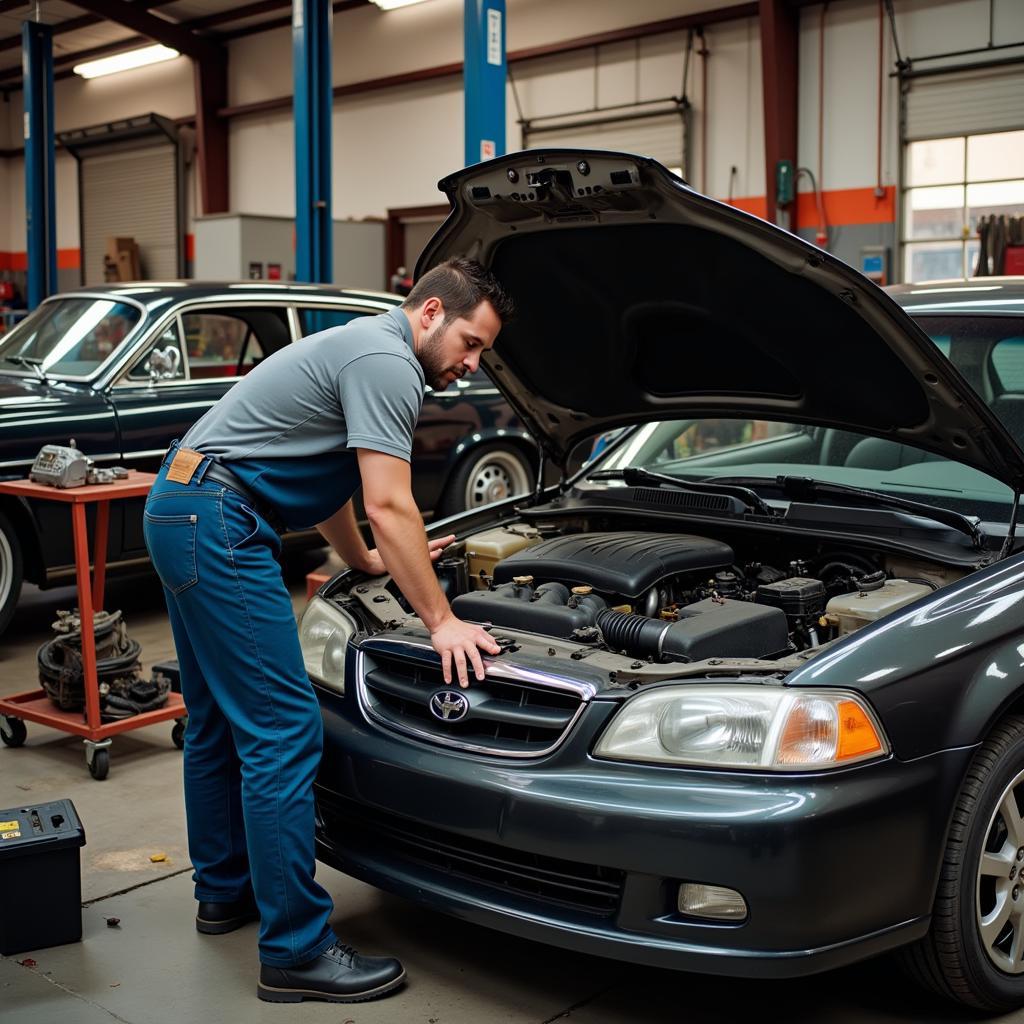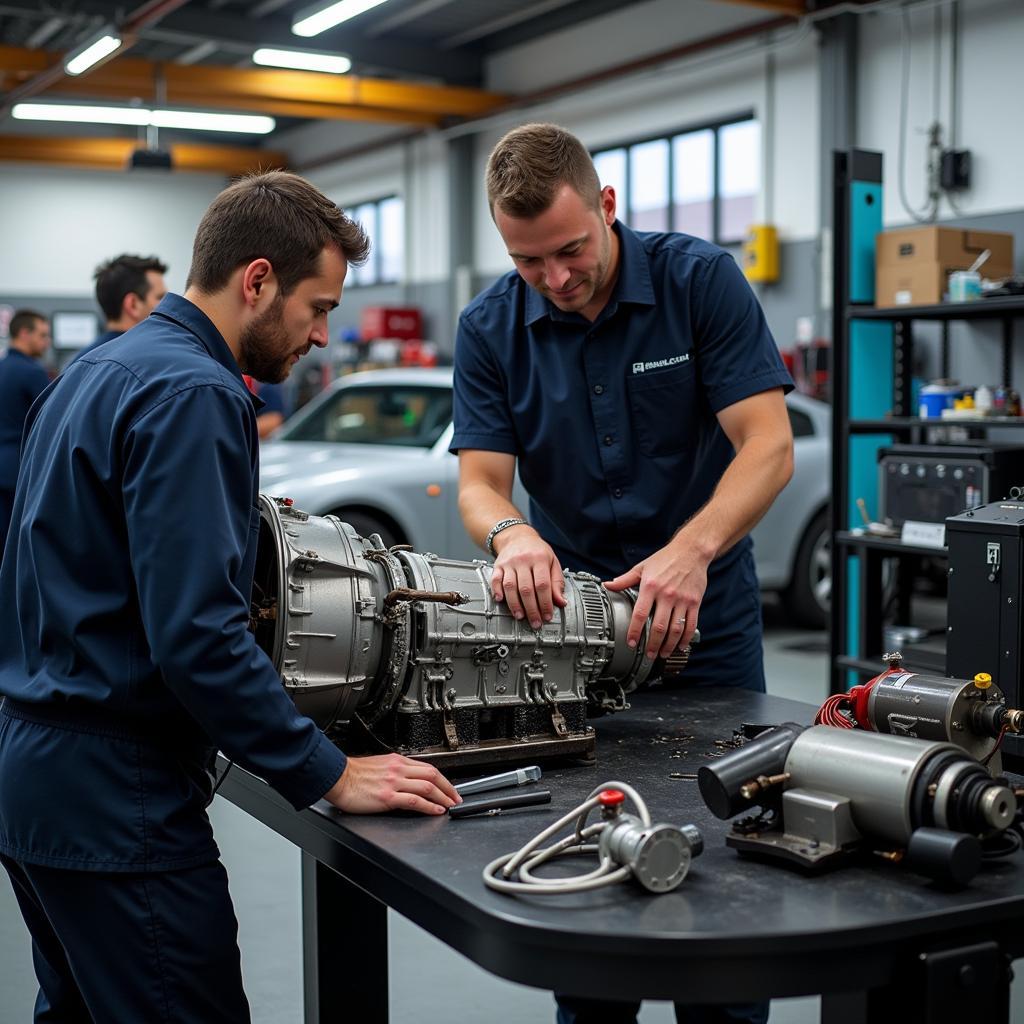What Are the Different Types of Service Facilities for Cars?
When it comes to keeping your car running smoothly, various types of service facilities cater to its needs. From routine maintenance to complex repairs, understanding the different options available ensures you choose the right facility for your car’s specific requirements.
Decoding the Car Service Landscape: A Guide to Different Facility Types
Choosing the right car service facility can feel overwhelming with so many options. This guide breaks down the common types, their services, and when to use them:
1. Independent Garages: Your Neighborhood Mechanics
 Mechanic working on a car in an independent garage
Mechanic working on a car in an independent garage
Independent garages, often family-owned and operated, are your friendly neighborhood mechanics. They offer a wide range of services, including:
- Routine Maintenance: Oil changes, filter replacements, tire rotations, and brake inspections.
- Mechanical Repairs: Engine diagnostics and repair, transmission work, suspension system fixes.
- Electrical System Services: Battery replacement, alternator and starter repairs, lighting and wiring issues.
Pros:
- Personalized Service: Build relationships with mechanics who understand your car’s history.
- Competitive Pricing: Often more affordable than dealerships, especially for routine maintenance.
Cons:
- Expertise Varies: Mechanic skill levels can differ, so research and choose a reputable garage.
- Limited Warranty Coverage: Warranties may not be as comprehensive as those offered by dealerships.
2. Dealerships: Brand-Specific Expertise
 Modern and well-equipped service center at a car dealership
Modern and well-equipped service center at a car dealership
Dealerships specialize in the make and model of vehicles they sell. They offer:
- Warranty Repairs: Covered repairs during your car’s manufacturer warranty period.
- Recall Work: Addressing manufacturer-identified safety or performance issues.
- Specialized Services: Access to brand-specific tools, parts, and technical expertise.
Pros:
- Factory-Trained Technicians: Mechanics trained specifically on your car’s make and model.
- Genuine Parts: Use of original equipment manufacturer (OEM) parts for optimal compatibility.
Cons:
- Higher Costs: Generally more expensive than independent garages, especially for routine maintenance.
- Potential Upselling: May be more likely to recommend additional services than necessary.
3. Specialty Shops: Masters of Their Craft
 Specialized technicians working on a car's transmission
Specialized technicians working on a car's transmission
Specialty shops focus on specific areas of car repair, such as:
- Transmission Shops: Experts in automatic and manual transmission repair and rebuilding.
- Body Shops: Handle collision repair, dent removal, painting, and frame straightening.
- Exhaust Shops: Specialize in exhaust system repairs, replacements, and custom exhaust installations.
Pros:
- Unmatched Expertise: Highly skilled technicians dedicated to a specific area of car repair.
- Specialized Equipment: Access to tools and equipment specifically designed for their niche.
Cons:
- Limited Service Range: Only offer services within their area of specialization.
- Potentially Higher Costs: Specialized expertise can come at a premium price.
4. Quick Lube Centers: Maintenance on the Go
Quick lube centers focus on speedy routine maintenance services:
- Oil Changes: Fast and efficient oil and filter changes.
- Fluid Top-offs: Replenishing essential fluids like coolant, brake fluid, and power steering fluid.
- Tire Services: Air pressure checks, tire rotations, and flat tire repairs.
Pros:
- Convenience: No appointments needed, often with extended hours.
- Speed: Services typically completed within 30 minutes.
Cons:
- Limited Services: Focus primarily on basic maintenance.
- Potential Upselling: May push additional services or products that might not be necessary.
5. Mobile Mechanics: Convenience at Your Doorstep
Mobile mechanics bring the service to you, offering:
- On-Site Repairs: Minor to moderate repairs conducted at your home or office.
- Diagnostic Services: Troubleshooting issues using mobile diagnostic equipment.
- Preventative Maintenance: Oil changes, filter replacements, and other routine tasks.
Pros:
- Ultimate Convenience: No need to drive to a shop, saving you time and hassle.
- Personalized Attention: One-on-one service and direct communication with the mechanic.
Cons:
- Limited Service Scope: Complex repairs requiring specialized equipment may not be possible.
- Weather Dependence: Service may be affected by weather conditions.
Choosing the Right Fit: Matching Your Needs to the Service
Selecting the ideal car service facility depends on factors like the type of service needed, your budget, and your personal preferences.
- Routine Maintenance: Quick lube centers or independent garages offer cost-effective solutions for regular upkeep.
- Warranty Repairs: Dealerships are your go-to for warranty-covered services and recalls.
- Complex Repairs: Opt for dealerships or specialized shops when dealing with intricate engine, transmission, or electrical issues.
- Convenience is Key: Mobile mechanics provide unparalleled convenience for routine maintenance and minor repairs.
Beyond the Basics: Additional Factors to Consider
When choosing a facility, consider:
- Reputation: Look for online reviews, ask for recommendations, and check with your local Better Business Bureau.
- Warranties: Understand the warranty coverage provided on parts and labor.
- Communication: Choose a facility that communicates clearly, explains repairs thoroughly, and provides transparent pricing.
By understanding the different types of car service facilities and considering these factors, you can make an informed decision and ensure your vehicle receives the care it deserves.

